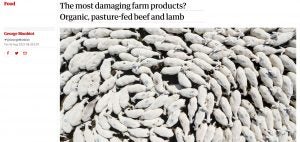Not much about “ag-vocating” surprises me anymore. I’ve literally heard it all: cow burps are destroying our planet, farmers don’t care about soil health, and Monsanto (or, MonSATAN, as they say) is seeking world domination — none of which, of course, are true.
But I was astonished to discover The Guardian recently published an article blasting organic agriculture. Titled The most damaging farm products? Organic, pasture-fed beef and lamb, the piece gives a synopsis of a shocking claim made by author George Monbiot in his new book, Regenesis: Feeding the World Without Devouring the Planet. Monbiot explains how organic animals have a higher carbon footprint:
Organic beef farms, whose animals take longer to raise and need even more land, lose twice as much nitrogen for each kilo of meat as conventional beef farms. In most cases, their … emissions are astonishingly high, even in comparison with conventional beef farming.
Before anyone gets too excited, Monbiot isn’t a fan of animal agriculture — conventional or organic. In The Guardian piece, and presumably his book, he argues that animal production is likely the most destructive industry on Earth. He even ends by accusing farmers and ranchers of engaging in a massive public-relations campaign aimed at selling the myth that animal agriculture isn’t all that bad. (That feels a bit like claiming everyone is a shill just because they bust myths and dispel disinformation. But whatever.)

So why do I think this article is worth mentioning? Because it presents a shift — however subtle — in The Guardian’s modus operatus. The publication isn’t known for its farmer-friendly content. Ironically, its plea for donations (conveniently located at the bottom of Monbiot’s article) claims that donor contributions give The Guardian “editorial independence” that allows it to prioritize the latest crisis without the influence of advertisers or politicians. (Let’s not forget that it was only a couple of years ago that The Guardian was paid $886,000 to write articles specifically criticizing animal agriculture’s impact.)
This kind of money in hand incentives The Guardian to publish inflammatory and anxiety-inducing content that’ll make you open your pocketbook (The Guardian’s longtime environmental editor, Damian Carrington, was a pro at this tactic).
Yet there’s really no better example among The Guardian’s contributor ranks than Carey Gillam. She’s notorious for her incendiary articles accusing agriculture companies (including the great MonSATAN), farmers, and the government of poisoning people and obliterating the environment.
In reality, Gillam is an organic activist hiding behind the guise of a journalist. Her focus on agriculture started when Reuters tasked her with covering the industry. She eventually accepted a paid gig with the U.S. Right to Know, an anti-GMO effort funded by the Organic Consumers Association. Gillam was USRTK’s highest paid staffer, bringing home a six-figure salary. She now runs The New Lede, an initiative by the Environmental Working Group (the same outfit responsible for that stupid Dirty Dozen list and one that has been deemed a “conspiracy-pseudoscience source” with low credibility by Media Bias/Fact Check), that regularly covers pesticide use, litigation, and regulation. (Despite much of her recent work being done in connection to prominent activist organizations, in an email to AGDAILY, Gillam defended her communications, saying she does her “best to remain fair and balanced in my writing and reporting.”)
The Guardian has absolutely no problem publishing Gillam’s organic propaganda as if it were legitimate investigative journalism. And that’s despite the fact that Gillam has been roundly criticized (here’s my favorite) for being light on science and short on facts. In other words, Gillam is nothing more than an organic mouthpiece — and The Guardian is totally fine with it.
So when The Guardian publishes a piece calling out organic agriculture without pulling any punches, it’s noteworthy. Does this represent a schism within Team Organic? Has The Guardian decided to part ways with Gillam and her buddies? Or have they legitimately figured out that organic production isn’t the epitome of sustainability?
At this point, none of us know the answer. I really hope it’s the latter, because we’re inundated with enough fake news, propaganda, and [insert your own politically charged descriptor here]. Given the tone of Monbiot’s article, I doubt that’s the case. That guy just hates all farmers. He’s an equal-opportunity critic, if you will.
Whatever the reason, I’m happy to see someone challenge the drivel of organic activists. It’s even better because it’s published by an outlet that’s pushed the narrative for so long. Editorial independence, forsooth!
Amanda Zaluckyj blogs under the name The Farmer’s Daughter USA. Her goal is to promote farmers and tackle the misinformation swirling around the U.S. food industry.
Updates on 08/22/2022: The name of Carey Gillam’s current organization, The New Lede, was misspelled in the original version of this article. It has been corrected. AGDAILY also amended this article’s description of The New Lede’s portfolio in that it “regularly covers pesticide use, litigation, and regulation.”



